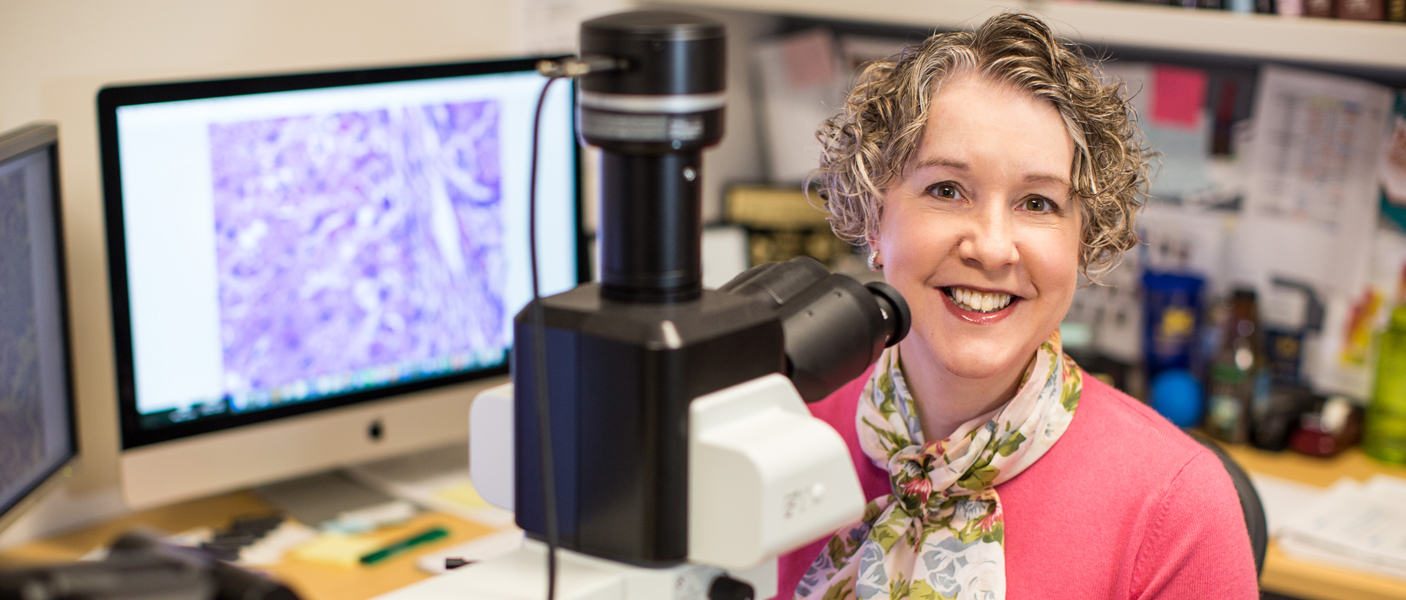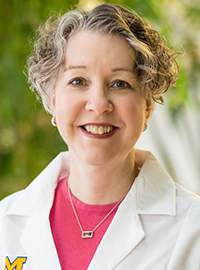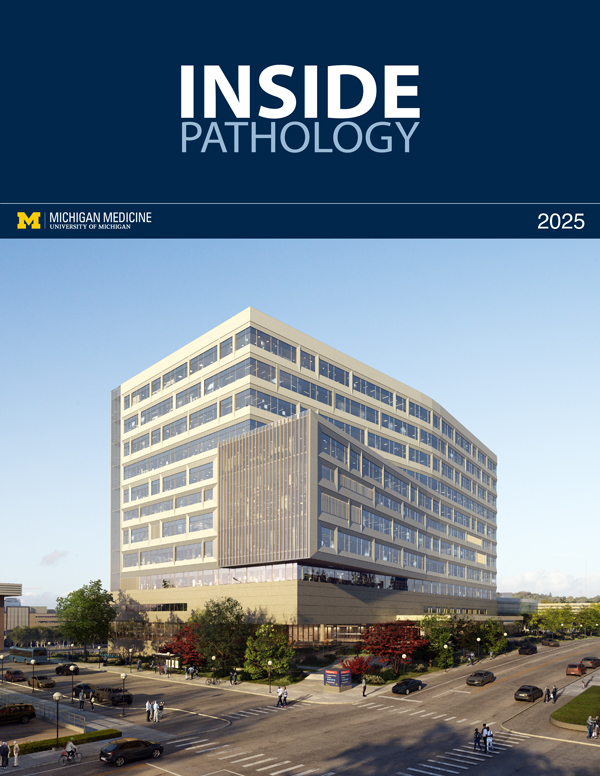

This is the first in a series of interviews with the Department of Pathology Endowed Professors.
An endowed professorship helps keep U-M a critical player in an ever-present quest to recruit and retain first-rate faculty. It’s a tool all universities employ. An endowed professorship recognizes the distinction of outstanding faculty while providing invaluable support beyond salary. Not only does it celebrate a current faculty member, it also honors the legacy of someone who made great impact on the University either with academic, departmental, or financial contributions.
 To kick off this series, we begin with Laura Webb Lamps, MD, who is the Godfrey D. Stobbe Professor of Gastrointestinal Pathology at the University of Michigan Department of Pathology. She is also the Patient Safety Officer for the University of Michigan Hospital. Dr. Lamps, originally from Auburn, Alabama, received her BS degree from Davidson College, followed by her MD from Vanderbilt University in 1992. She also completed her residency and surgical pathology fellowship training at Vanderbilt.
To kick off this series, we begin with Laura Webb Lamps, MD, who is the Godfrey D. Stobbe Professor of Gastrointestinal Pathology at the University of Michigan Department of Pathology. She is also the Patient Safety Officer for the University of Michigan Hospital. Dr. Lamps, originally from Auburn, Alabama, received her BS degree from Davidson College, followed by her MD from Vanderbilt University in 1992. She also completed her residency and surgical pathology fellowship training at Vanderbilt.
Dr. Lamps easily provided endearing and honest answers to our questions.
Q: What did you want to be when you “grew up?”
A: At first, I wanted to be a princess, but after many conversations, my parents finally convinced me that there was not a Princess of Alabama and that my opportunities in other geographic locations were probably limited. Then I wanted to be a veterinarian but quickly realized that I wasn’t tough enough to care for sick animals day in and day out. My dad was a surgeon and he loved his job so much, and I think that really made me think about a career in medicine.
Q: Who was influential in getting you to this point in your career? How/why?
A: My dad was, for sure, because even though he worked really, really hard, he always loved his job and never complained about how tough it was. When I was a medical student, I had a great professor and mentor, Dr. George Gray, who was head of the medical student pathology course and Director of Surgical Pathology at Vanderbilt. George saw how much I loved the pathology class and encouraged me to pursue it as a career. He was a great example of a mentor - he didn’t care if you were male, female, black, white, purple, green, gay, straight, Martian, Democrat, Republican, Wiccan, whatever - he was just interested in cultivating talent in pathology and making sure students knew what pathology was as a career.
When I was a senior resident and had decided to go into GI pathology, I had the opportunity to spend a month with the late Dr. Rodger Haggitt at the University of Washington, who was essentially one of the people (along with Dr. Appelman) who established the field of GI pathology. He was an exemplary leader and academic pathologist, and that was a great formative experience for a resident to have.
Q: What have you found rewarding about a career in pathology?
A: I love the mix of things I get to do as an academic pathologist. I love to sign out cases and would do that all day long, but I also get to teach, write, do research, do administrative work, and work with tons of interesting and talented people. It’s a great and very rewarding variety of activities. There are days that I have been frustrated, upset, or even mad, but I’ve never been bored, not for a day. It’s a blessing to have a job where you get to keep learning, but they still pay you.
Q: What advice would you give students considering a career in pathology?
A: People always joke about pathologists being introverts and poor communicators. That could not be further from the truth. Pathologists just communicate with other physicians more than they communicate with patients, although that is also changing. I think most pathologists love actually studying the pathobiology of disease, and you have to be a good communicator to be able to convey pathology results (either clinical or anatomic) that reflect that pathobiology effectively and help integrate them into the patient’s care. Most pathologists are also able to take huge amounts of information and distill them down into a few important points that are pertinent. And of course, anatomic pathologists are typically good “visual processors.” So, I would say that if you love studying disease, and you love being part of a multidisciplinary team that cares for patients, and especially if you enjoy microscopy or other analytical methods, you should really consider pathology.
Q: How has being an endowed professor made a difference in your career?
A: The endowed professorships that the U-M Department of Pathology has are a huge benefit to recruiting. When I was first talking to Dr. Myers about interviewing in the Department, and he told me about the endowed professorships, it emphasized just how much the department values academic scholarship, leadership, and education. I have realized even more that this is the case now that I work here. I feel very lucky to have been recognized as a Godfrey D. Stobbe Professor and to have the resources that come with that to further our programs, particularly around patient safety and quality of care. I am also very grateful to Dr. Stobbe for his generosity to our department, and proud to be part of his legacy.
Q: What are you working on right now?
A: A textbook on liver pathology, several manuscripts with trainees, and teaching in the High-Reliability program for the entire institution as part of my other job (Patient Safety Officer). I am also thinking about writing something on navigating an academic career for junior faculty.
Q: What qualities make a great leader?
A: If I had to boil it down to one thing, I would say that great leaders can set aside their own personal agendas and truly focus on the good of the organization. It doesn’t matter what the organization is, but a good leader needs to make the welfare of that organization their number one priority, even if their own goals and achievements take a back seat to that. Empathy is a great leadership quality, too, and the realization that we never truly know what’s going on in someone else’s life. And being a really good listener.
Q: If you could learn to do anything, what would it be?
A: There are so many things. Learn to knit better. Learn to make bread. Learn to do a handstand in yoga without the wall for support. Learn to grow more flowers. The list is always getting longer.
 ON THE COVER
ON THE COVER
Breast team reviewing a patient's slide. (From left to right) Ghassan Allo, Fellow; Laura Walters, Clinical Lecturer; Celina Kleer, Professor. See Article 2014Department Chair |

newsletter
INSIDE PATHOLOGYAbout Our NewsletterInside Pathology is an newsletter published by the Chairman's Office to bring news and updates from inside the department's research and to become familiar with those leading it. It is our hope that those who read it will enjoy hearing about those new and familiar, and perhaps help in furthering our research. CONTENTS
|
 ON THE COVER
ON THE COVER
Autopsy Technician draws blood while working in the Wayne County morgue. See Article 2016Department Chair |

newsletter
INSIDE PATHOLOGYAbout Our NewsletterInside Pathology is an newsletter published by the Chairman's Office to bring news and updates from inside the department's research and to become familiar with those leading it. It is our hope that those who read it will enjoy hearing about those new and familiar, and perhaps help in furthering our research. CONTENTS
|
 ON THE COVER
ON THE COVER
Dr. Sriram Venneti, MD, PhD and Postdoctoral Fellow, Chan Chung, PhD investigate pediatric brain cancer. See Article 2017Department Chair |

newsletter
INSIDE PATHOLOGYAbout Our NewsletterInside Pathology is an newsletter published by the Chairman's Office to bring news and updates from inside the department's research and to become familiar with those leading it. It is our hope that those who read it will enjoy hearing about those new and familiar, and perhaps help in furthering our research. CONTENTS
|
 ON THE COVER
ON THE COVER
Director of the Neuropathology Fellowship, Dr. Sandra Camelo-Piragua serves on the Patient and Family Advisory Council. 2018Department Chair |

newsletter
INSIDE PATHOLOGYAbout Our NewsletterInside Pathology is an newsletter published by the Chairman's Office to bring news and updates from inside the department's research and to become familiar with those leading it. It is our hope that those who read it will enjoy hearing about those new and familiar, and perhaps help in furthering our research. CONTENTS
|
 ON THE COVER
ON THE COVER
Residents Ashley Bradt (left) and William Perry work at a multi-headed scope in our new facility. 2019Department Chair |

newsletter
INSIDE PATHOLOGYAbout Our NewsletterInside Pathology is an newsletter published by the Chairman's Office to bring news and updates from inside the department's research and to become familiar with those leading it. It is our hope that those who read it will enjoy hearing about those new and familiar, and perhaps help in furthering our research. CONTENTS
|
 ON THE COVER
ON THE COVER
Dr. Kristine Konopka (right) instructing residents while using a multi-headed microscope. 2020Department Chair |

newsletter
INSIDE PATHOLOGYAbout Our NewsletterInside Pathology is an newsletter published by the Chairman's Office to bring news and updates from inside the department's research and to become familiar with those leading it. It is our hope that those who read it will enjoy hearing about those new and familiar, and perhaps help in furthering our research. CONTENTS
|
 ON THE COVER
ON THE COVER
Patient specimens poised for COVID-19 PCR testing. 2021Department Chair |

newsletter
INSIDE PATHOLOGYAbout Our NewsletterInside Pathology is an newsletter published by the Chairman's Office to bring news and updates from inside the department's research and to become familiar with those leading it. It is our hope that those who read it will enjoy hearing about those new and familiar, and perhaps help in furthering our research. CONTENTS
|
 ON THE COVER
ON THE COVER
Dr. Pantanowitz demonstrates using machine learning in analyzing slides. 2022Department Chair |

newsletter
INSIDE PATHOLOGYAbout Our NewsletterInside Pathology is an newsletter published by the Chairman's Office to bring news and updates from inside the department's research and to become familiar with those leading it. It is our hope that those who read it will enjoy hearing about those new and familiar, and perhaps help in furthering our research. CONTENTS
|
 ON THE COVER
ON THE COVER
(Left to Right) Drs. Angela Wu, Laura Lamps, and Maria Westerhoff. 2023Department Chair |

newsletter
INSIDE PATHOLOGYAbout Our NewsletterInside Pathology is an newsletter published by the Chairman's Office to bring news and updates from inside the department's research and to become familiar with those leading it. It is our hope that those who read it will enjoy hearing about those new and familiar, and perhaps help in furthering our research. CONTENTS
|
 ON THE COVER
ON THE COVER
Illustration representing the various machines and processing used within our labs. 2024Department Chair |

newsletter
INSIDE PATHOLOGYAbout Our NewsletterInside Pathology is an newsletter published by the Chairman's Office to bring news and updates from inside the department's research and to become familiar with those leading it. It is our hope that those who read it will enjoy hearing about those new and familiar, and perhaps help in furthering our research. CONTENTS
|
 ON THE COVER
ON THE COVER
Rendering of the D. Dan and Betty Khn Health Care Pavilion. Credit: HOK 2025Department Chair |

newsletter
INSIDE PATHOLOGYAbout Our NewsletterInside Pathology is an newsletter published by the Chairman's Office to bring news and updates from inside the department's research and to become familiar with those leading it. It is our hope that those who read it will enjoy hearing about those new and familiar, and perhaps help in furthering our research. CONTENTS
|

MLabs, established in 1985, functions as a portal to provide pathologists, hospitals. and other reference laboratories access to the faculty, staff and laboratories of the University of Michigan Health System’s Department of Pathology. MLabs is a recognized leader for advanced molecular diagnostic testing, helpful consultants and exceptional customer service.